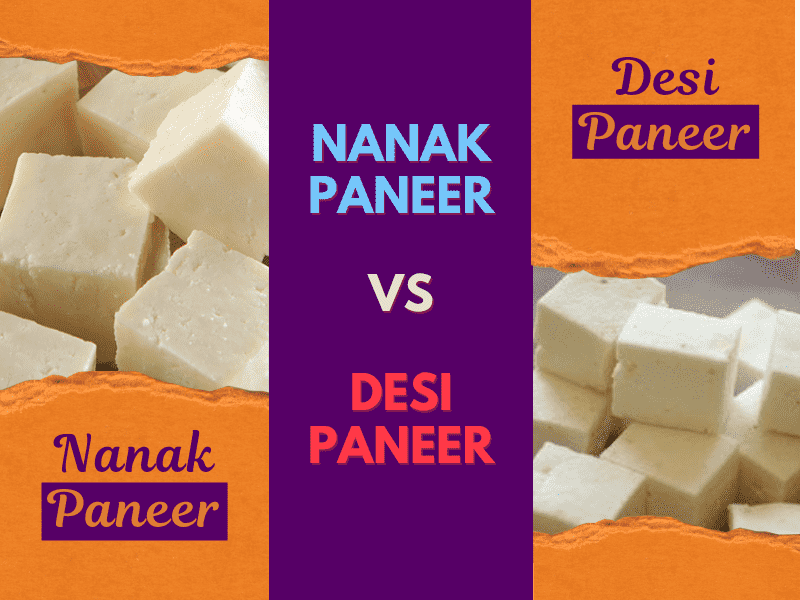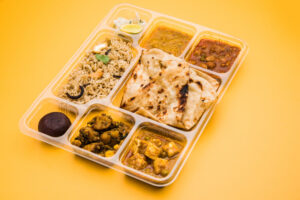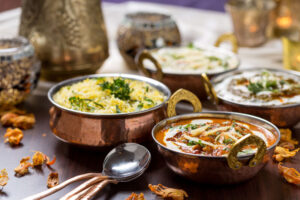The health benefits of paneer are widely acclaimed due to its smooth texture, ideal moisture content, and calorie count. With so many brands offering fresh cottage cheese, it can be daunting to select the right one for you. Today, we will draw a comparison of Desi paneer vs Nanak paneer and help you make an informed decision about these brands.
1. Desi Paneer Vs Nanak Paneer: Brand Origin
Desi paneer is basically pure, organic paneer (cottage cheese) derived from all-natural quality ingredients. Desi paneer contains lower fat than other brands and is naturally processed with nutrient-rich derivatives.
Desi Natural paneer products are GMP-free which means that they are completely free from preservatives, toxins, and chemicals. Desi paneer is even available in two options: low-fat vs full-fat paneer, which is perfect for your dietary needs. To know more about this fresh cheese and compare it with others, check out some beyaz peynir vs paneer facts.
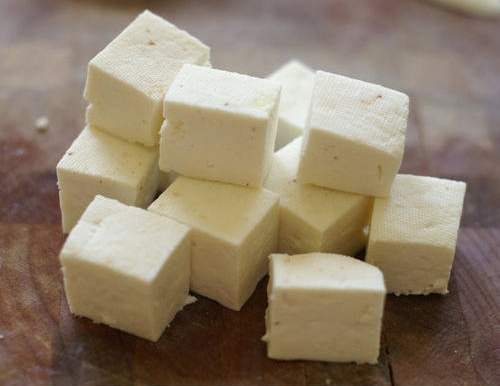
Nanak paneer is crafted with the goodness of wholesome, fresh ingredients. Nanak paneer provides state-of-the-art excellent quality paneer that is soft and springy to the touch. Nanak Foods is a trustworthy brand that is dedicated to providing delectable Indian products and making them accessible across the globe.
Nanak paneer can be consumed by itself or served in entrees, appetizers, tandoori, basmati rice, or barbecue vegetable cuisine. Malai paneer vs paneer Nanak is a popular combination that instantly enriches the taste of an Indian dish due to its excellent sliceability.
Nanak Paneer is made from rBST-free milk which essentially means that the cows are not injected with the hormone recombinant bovine somatotropin to haphazardly increase milk production. This makes Nanak Paneer a sustainable, eco-friendly brand.
Desi paneer and Nanak paneer are both a great choice if you are looking to spruce up your foods with a little bit of spice! Here are some main Desi paneer vs Nanak paneer differences.
2. History
Desi natural paneer was developed by Sundeep, a well-established Indian caterer who made his own yogurt for sweets and drinks. He realized that there were no authentic products, and most of the paneer in Indian stores at that point in time had American-style products. After a number of samples, Desi natural paneer was able to emulate the flavor and textures the Indian community expected.
Nanak paneer finds its roots in Canada, a famous product by Nanak foods. This company had a slow start, but its first product, paneer, was an instant success in 1998. Gurpreet Arneja and Vineet Taneja first discussed the time-consuming task of making paneer over a fine afternoon lunch. By 2000, Nanak foods were shipping across the globe.
3. Culture
Desi Natural engenders a delightful fusion of tastes, bringing home cherished aromas and authentic flavors. With Desi paneer, you can taste the tradition in every bite.
Nanak Foods evokes a sense of belonging from miles away and cherishes the Indian culture by specializing in Indian dairy & food products. Desi paneer, in particular, captures the essence of Indian food and makes every mouthful a traditional experience.
4. Taste
When we compare the taste of Desi paneer vs Nanak paneer, both of them are uniquely textured and taste delicious on their own. While Desi paneer has a natural, milky taste reminiscent of homemade paneer, Nanak paneer has a wonderful nuttiness that is perfect for absorbing a creamy sauce. Special sauces like Szechuan sauce, Manchurian sauce, black pepper sauce, saffron cashew sauce, and sweet chili sauce work well for fusion dishes as well.
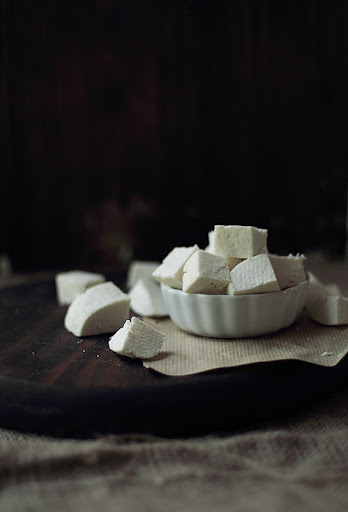
5. Texture
The texture of Desi paneer vs Nanak paneer is accentuated when we compare both cubes. The texture of Desi paneer is crumbly and soft, so it is perfect for layering in curry dishes and even as a topping for salads and pizzas. On the other hand, the Nanak paneer has a firm and creamy texture but is easy to cut through. It is one of the best store-brought paneers.
6. Smell
Desi paneer has a faint smell as it contains no added preservatives in its natural formulation. The authentic block of paneer smells delightful when used as the main ingredient in curries and paired with Indian bread and basmati rice.
Nanak paneer has a rich milky aroma that accompanies its soft and mellow body. It is also a great addition to your food.
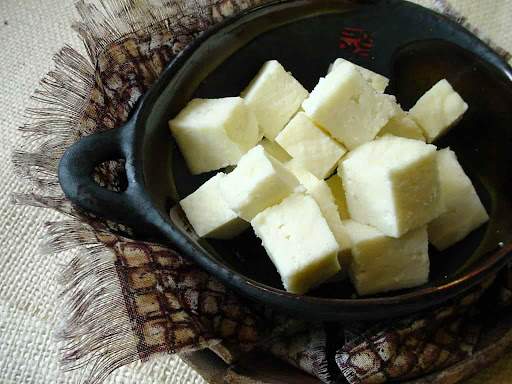
7. Calories
Desi paneer is low in calories and is made from natural grade-A milk. Desi paneer contains 75 calories per serving as compared to Nanak paneer, which provides 90 calories in total.
8. Nutrition
Since Desi paneer is derived from cow or buffalo’s milk, it is fairly low in fats and rich in protein. Desi paneer is high in nutritional value as it contains two ingredients: pasteurized milk and vinegar. While pasteurized milk provides 6g protein and 20mg calcium, vinegar is used as a plant-derived acid for curdling milk.
On the contrary, Nanak paneer is 100% vegetarian and even provides a generous amount of proteins, carbohydrates, fats, and calcium per serving. Nanak paneer even endorses a healthy lifestyle and is an excellent source of protein and calcium.
9. Preservation Techniques
Desi paneer can be stored in a refrigerator for 2-3 days if it is sealed in an air-tight container. Nanak paneer has an excellent freeze-thaw capacity which means that it shows resistance to deterioration even if the temperature fluctuates. It has a durable shelf life and impressive quality. If you are curious about where to buy paneer cheese online, check out this link.
10. Methods of Preparation
Desi paneer is incredibly versatile due to its moist, spongy texture. Some dishes that work well with Desi paneer are listed below:
- Pizza topping
- Paneer kebab
- Curries
- Salads
No one can say No to Pizza????
— Kitchen Cheers (@kitchencheers) July 28, 2017
Item:- desi paneer
Place:- The bake room
#thekitchencheers#cheerstokitchen#foodgasm#feedyoursoul#keephogging pic.twitter.com/sOLksuHA6C
Nanak paneer is the perfect ingredient in numerous recipes.
Some of the restaurant-style recipes are listed below.
- Shahi paneer
- Matar Paneer
- Fried Paneer
- Paneer butter masala
- Paneer Makhani
- Paneer tikka masala
Nanak paneer is a great addition to your curry-based recipes as it is non-melting and compact. Other variants include fried paneer and Nanak malai paneer.
Paneer Nanak vs Deep is another popular comparison.
